Panoramic Photo Above:
Wrigley Field, Chicago
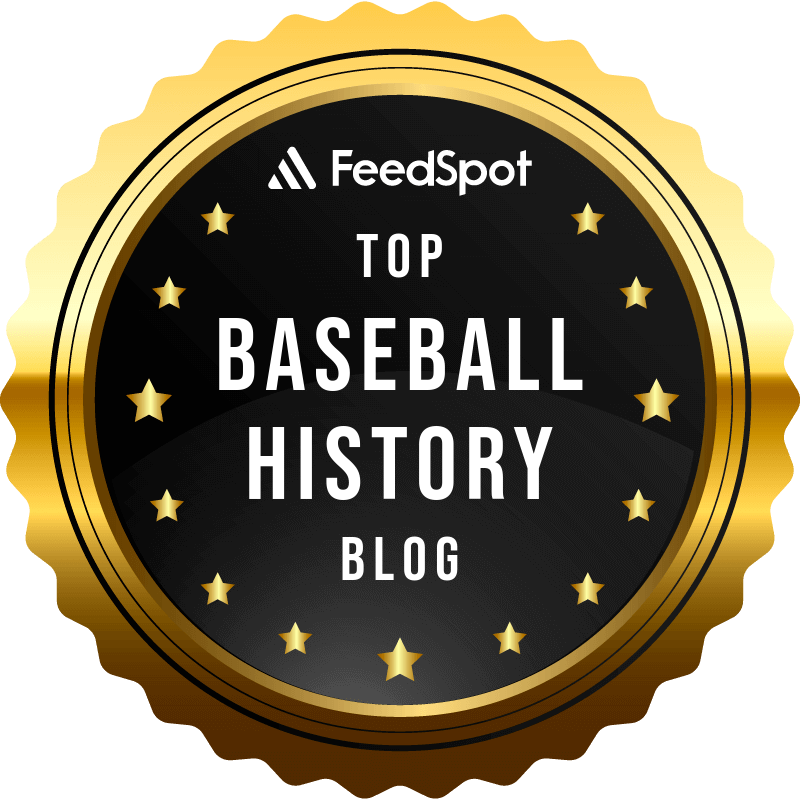
Baseball History Comes Alive Now Ranked As a Top Five Website by Feedspot Among All Baseball History Websites and Blogs!
(Check out Feedspot's list of the Top 35 Baseball History websites and blogs)
Guest Submissions from Our Readers Always Welcome! Click for details
Subscribe to Baseball History Comes Alive for automatic updates (sign-up block found in right side-bar)
As a Free Bonus for subscribing, you’ll get instant access to my two Special Reports: Memorable World Series Moments and Gary’s Handy Dandy World Series Reference Guide!
Boston Braves Photo Gallery
Click on any image below to see photos in full size and to start Photo Gallery:
The Demise of a Great Franchise: The Boston Braves
Sixty-eight years ago, March 13, 1953, on the day that will become known as “Black Friday” in Boston, Braves owner Lou Perini announced he will seek permission from the National League to move his franchise to Milwaukee, home of the team’s top minor-league club. The Braves owner cited poor attendance as the reason for asking to relocate the club, after their 82 years in the New England city.
If there is any doubt as to why Perini and the Braves felt compelled to move to Milwaukee in 1953, check out the featured photo. That’s from Opening Day, 1952 with near-empty stands. They drew only 281,000 fans for the entire year. Only two games drew more than 10,000. And there was a great baseball town like Milwaukee courting Perinin and begging for a major league team.
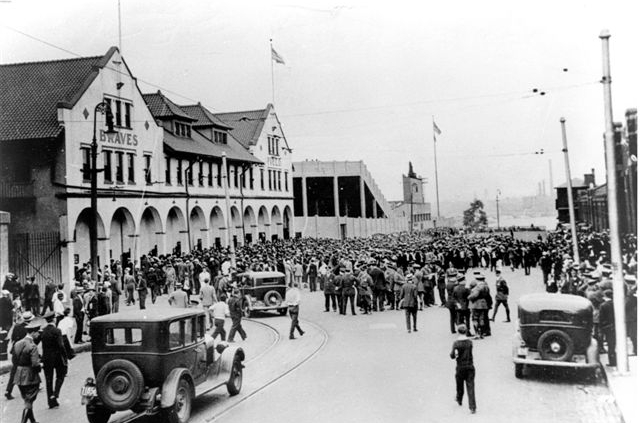
The move to Milwaukee brought a sad end to one of baseball’s great franchises, the Boston Braves. The Braves were the longest continuous playing team in American professional sports, having started in 1871 as the Boston Red Stockings, a member of the National Association.
Here’s a few words about the Braves’ great history:
In 1876, Boston Red Caps became a charter member of the newly formed National League and were a powerhouse for most of the 19th century. By 1883 they had adopted the name “Beaneaters.” The 1898 team finished 102-47, a club record for wins that stood for nearly a century. They won eight pennants in the 19th century, two under baseball pioneer Harry Wright, and five under Hall-of-Fame manager Frank Selee. The Boston franchise played at South End Grounds from 1871-1914.
With the arrival of the American League in 1901, things changed drastically for the Beaneaters. The team was decimated by competition from the new American League Boston entry, and many of their stars jumped to the new team under the lure of higher contracts. They only managed one winning season from 1900 to 1913, and lost 100 games five times.
In 1907, wearing all-white uniforms they were called the “Doves” and the “Rustlers” in 1911. The team adopted an official name, “Braves,” for the first time in 1912. This was followed two years later by one of the most memorable seasons in baseball history. After starting the 1914 season with a dismal 4-18 start, the Braves seemed to be headed for last place. At one point they were in the cellar at 26-40, 15 games out. From this low point, the “Miracle Braves,” led by stars Johnny Evers and Rabbit Maranville, got hot, closed out at 25-6, and won the National League pennant and the World Series over the heavily-favored Philadelphia Athletics. They are the only team to win a pennant after being in last place on the Fourth of July.
Their new park, Braves Field opened in August 1915. It was the largest park in the majors at the time, with 40,000 seats. The Braves again fell on hard times, with winning records only twice from 1917 to 1932. The Braves were competitive in
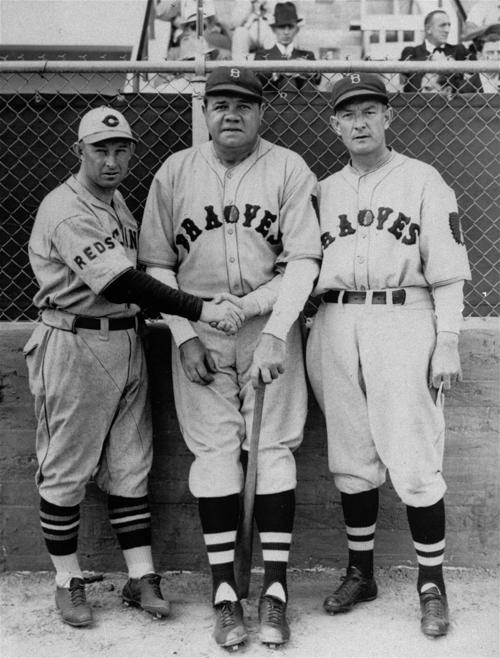
1933 and 1934 under manager Bill McKechnie, but they were hit hard by the Great Depression. Looking for a way to get more fans and more money, owner Judge Fuchs acquired Babe Ruth. The Bambino was told he could take over as manager once McKechnie stepped down—perhaps as early as 1936.
With his skills severely diminished and sensing he was on a franchise in complete disarray, Ruth retired on June 1. They ultimately finished 38-115, easily the worst season in franchise history. Their .248 winning percentage is the third-worst in baseball history.
After 1935, new ownership changed the name to the “Bees,” but under manager Casey Stengel, they fielded some of the worst teams ever. Things looked brighter when Lou Perini took over and they were again the Braves. By 1946, with phenom pitcher, Warren Spahn, the Braves were contenders. In 1948, the team won the pennant, behind the pitching of Spahn and Johnny Sain, who won 39 games between them, and “Spahn and Sain and pray for rain” entered the baseball lexicon. The Braves lost the 1948 World Series in six games to the Indians.
Sam Jethroe was acquired by trade from the Brooklyn Dodgers, on April 18, 1950
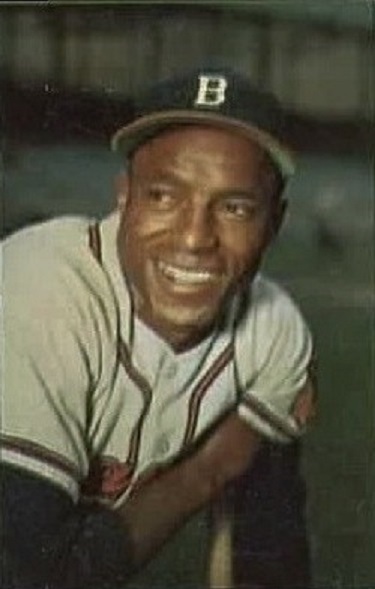
and became the franchise’s first African-American player. He went on to become the National League Rookie of the Year at age 32. A former Negro League star and military veteran, Jethroe remains the oldest player to have won Rookie of the Year honors. In 1950, Jethroe hit .273 with 100 runs, 18 home runs, 58 RBI, and led the National League with 35 steals
The year 1948 turned out to be the Braves’ last hurrah in Boston. Amid four mediocre seasons, attendance steadily dwindled until, on March 13, 1953, Perini announced he was moving the team to Milwaukee, thus becoming the Milwaukee Braves, where they won pennants in 1957 and 1958, with a World Series championship in 1957.
I’ll leave the story here. As we all know they later moved to Atlanta and went on to great success in the 1990s under general manager John Schuerholz and manager Bobby Cox, with a World Series championship in 1995.
Here’s a list of some notable player in Braves history:
- Earl Averill Boston Braves (1941), HOF
- Dave Bancroft Boston Braves (1924–27), HOF
- Alvin Dark Boston Braves (1946-49), ROY
- Johnny Evers Boston Braves (1914–17, 1929), HOF
- Burleigh Grimes Boston Braves (1930), HOF
- Billy Herman Boston Braves (1946), HOF
- Rogers Hornsby Boston Braves (1928), HOF
- Sam Jethroe Boston Braves (1950–52) ROY
- Ernie Lombardi Boston Braves (1942), HOF
- Al Lopez Boston Bees (1936–40), HOF
- Bill McKechnie Boston Braves (1913, Manager 1930-37), HOF
- Rabbit Maranville Boston Braves (1912–20, 1929–35), HOF
- Eddie Mathews Boston/Milwaukee/Atlanta Braves (1952–66),HOF
- Rube Marquard Boston Braves (1922–25), HOF
- Joe Medwick Boston Braves (1945), HOF
- Al Simmons Boston Bees (1939), HOF
- George Sisler Boston Braves (1928–30), HOF
- Billy Southworth Boston Braves (1921–23, Manager 1946-49, 1950–51), HOF
- Warren Spahn Boston Braves Boston/Milwaukee Braves (1942, 1946–64), HOF
- Casey Stengel Boston Braves (1924–25, Manager (1938-43), HOF
- Babe Ruth Boston Braves (1935), HOF
- Ed Walsh Boston Braves (1917), HOF
- Lloyd Waner Boston Braves (1941), HOF
- Paul Waner Boston Braves (1941–42), HOF
Gary Livacari
Photo Credits: All from Google search, and the Leslie Jones Boston Public Library collection
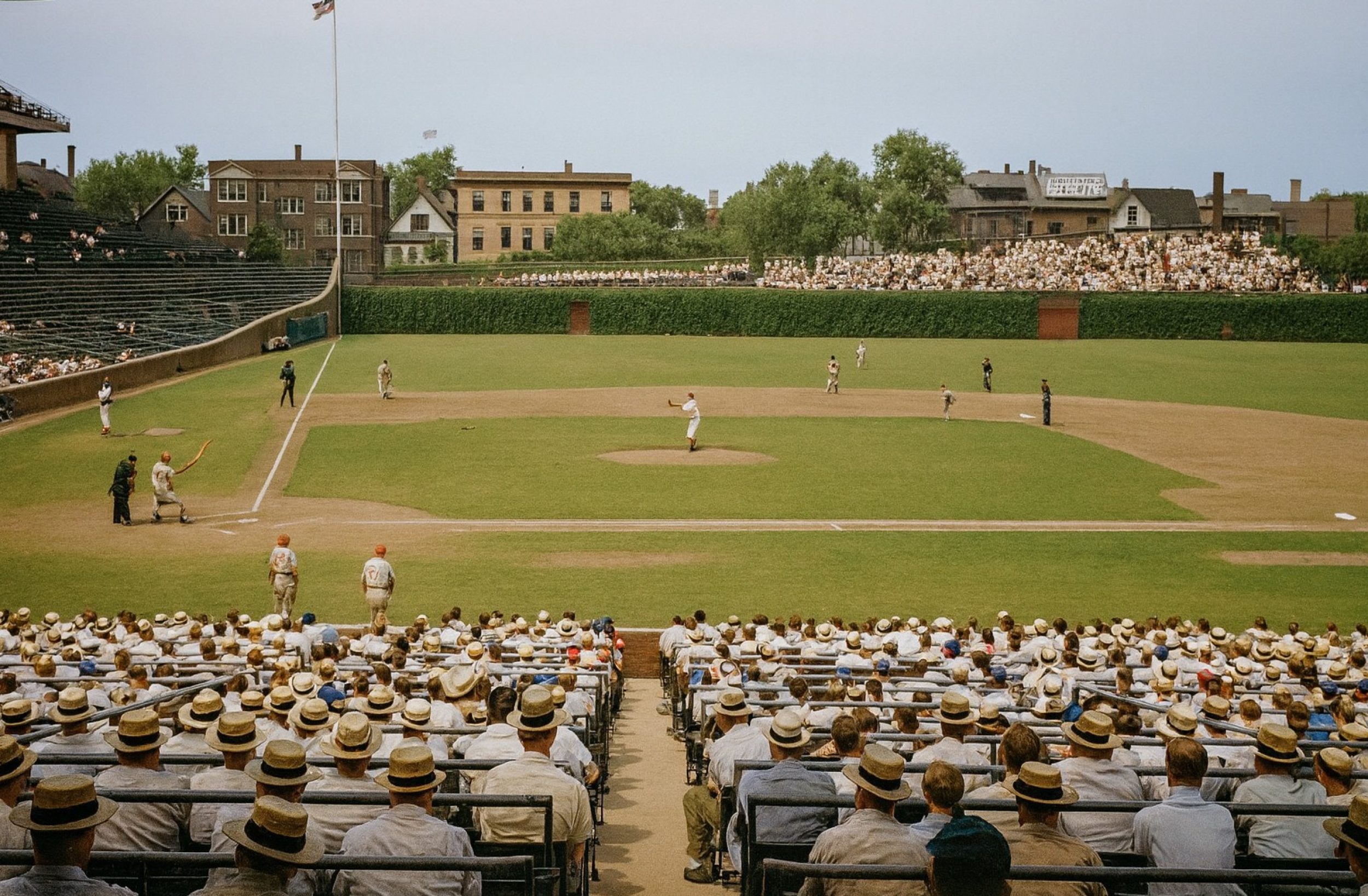
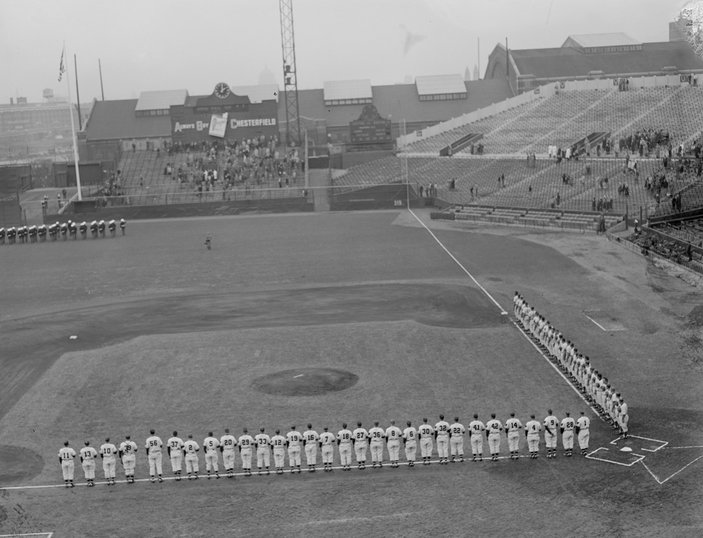
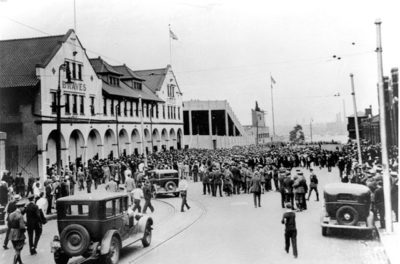
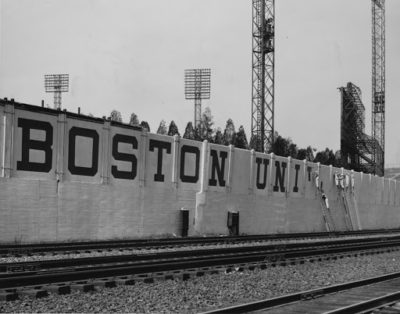
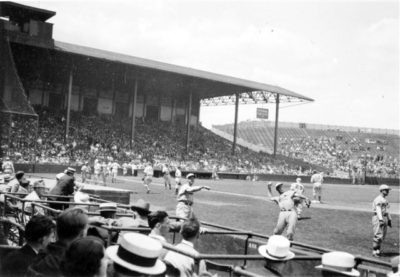
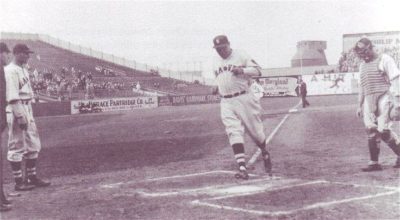
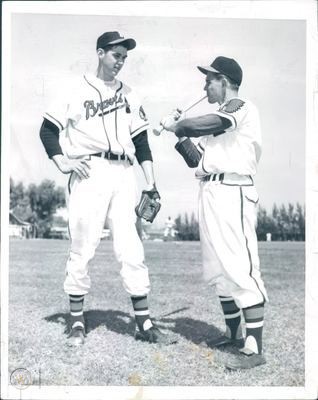
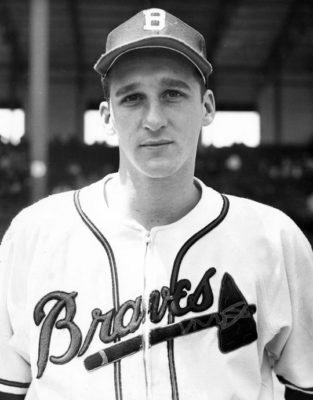
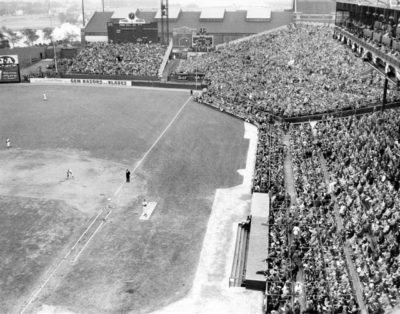
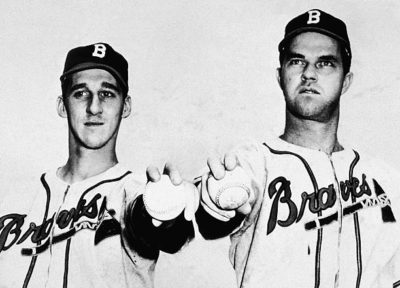
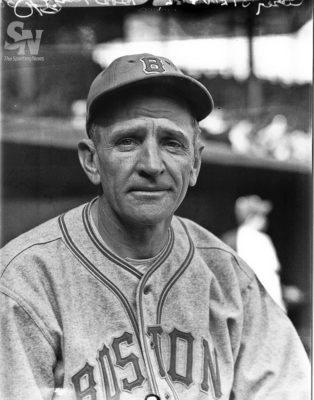
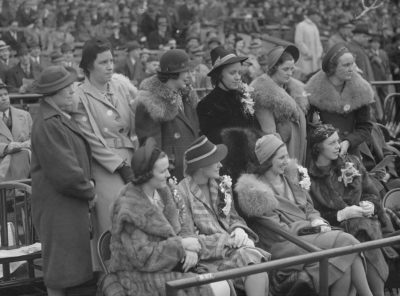
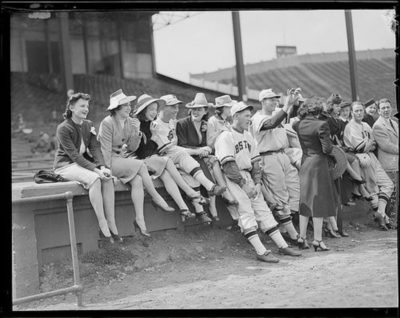
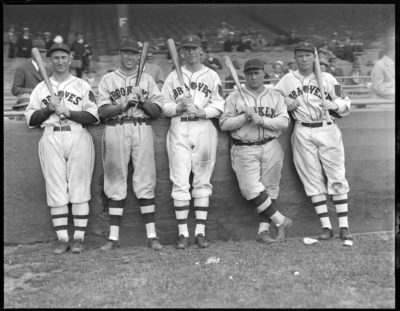
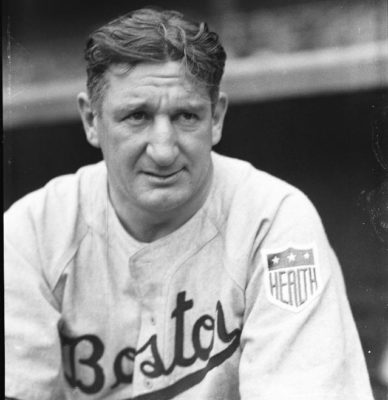
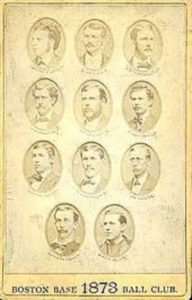
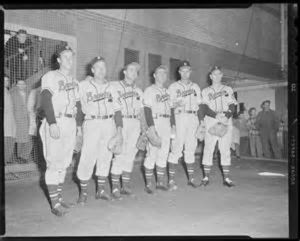
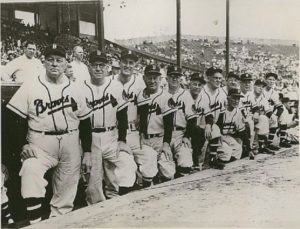

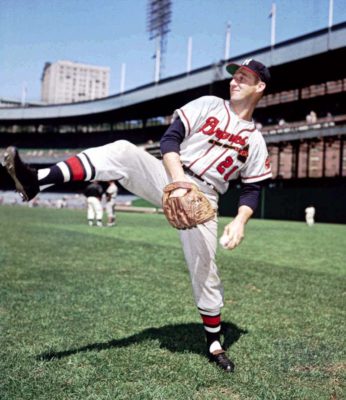
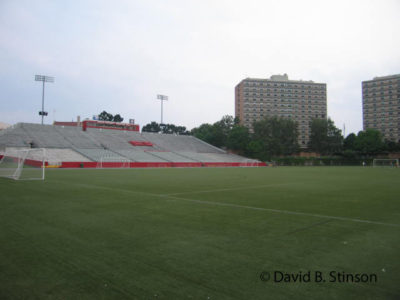
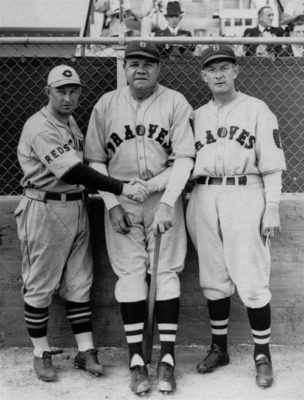
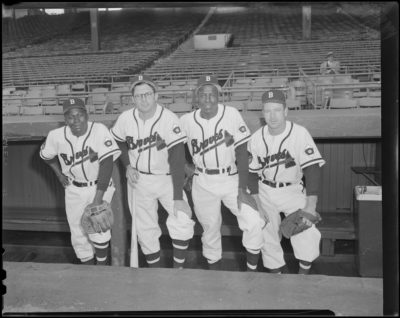
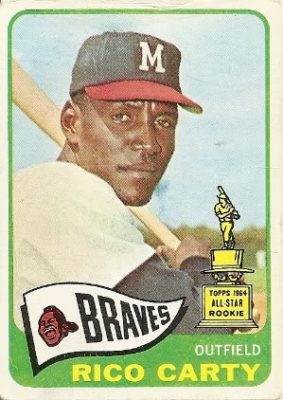
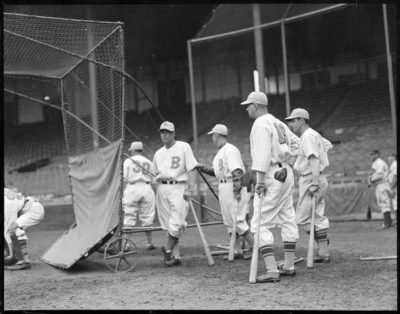
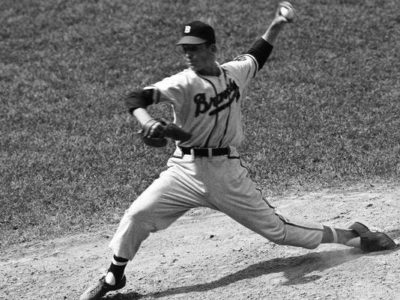
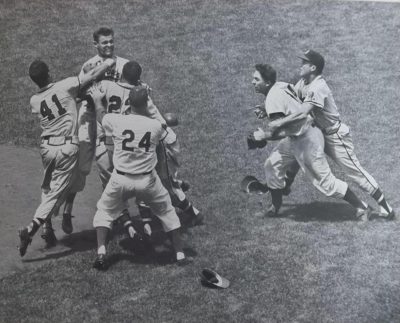
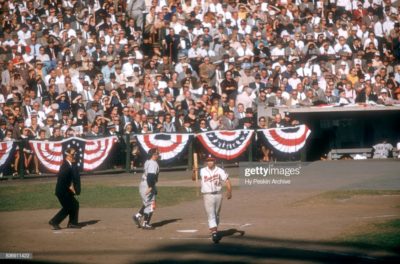
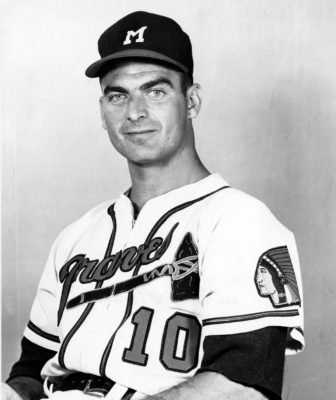
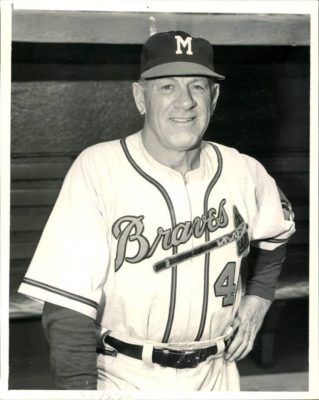
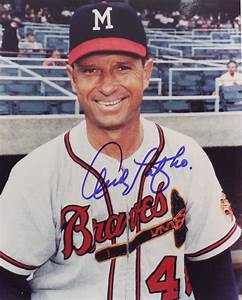
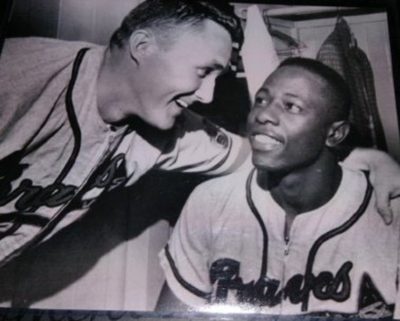
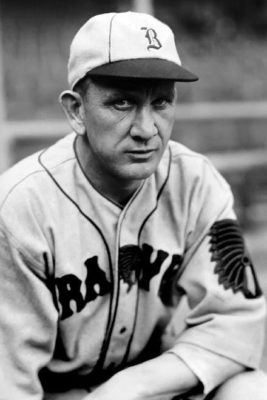
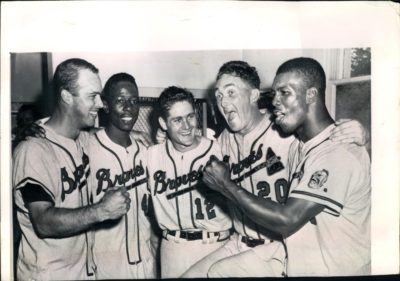

Former MLB GM Roland Hemond worked for the Boston Braves. He has always claimed that if the Braves hadn’t moved to Boston before the 1953 season they would still be in Boston today. With Aaron, Mathews And Spahn leading the way, the Braves started winning games.With those winning teams Hemond thought the Braves would have started drawing big crowds again in Boston. Plus the red Sox were not very good in the 1950s.
Thanks Wayne, I guess we can add that to “what might have been.”
Amazing. I had no idea. I thought they were a short-lived franchise. Good comment, Wayne.
It would have been tough to have been an outfielder covering that cavernous outer garden that was Braves Field.
Good point Dave, thanks.
Gary (aka DD)
I’m spending more time on this website than I am sleeping!
Just a few things pertinent to a very interesting article (the lead photo is a classic).
(1) The quote on Spahn and Sain is correct. But the better one, we heard growing up was, “Spahn and Sain and two days of rain.” This emphasizes the pitcher throwing every fourth day, in those days.
(2) You listed the many credentialed stars of the Boston Braves. But one of the great trades also involved Eddie Stanky: In Dec. ’49 The Giants got Alvin Dark and “The Brat” from Boston, giving up Willard Marshall, Sid Gordon, Buddy Kerr and pitcher Sam Webb. Stanky was a great Jints spark plug for two years and had a .460 OBP in 1950.
(3) Catcher Ernie Lombardi won his second batting title in his only year with Boston (.330). “Schnozz” was an amazing player. A truly tremendous hitter who swung a 42 ounce bat, but also the slowest runner in the game. He was once thrown out from shallow left field on a one hop liner, by the short stop (talk about your infield shifts!). He could hold seven baseballs in one hand. And Ernie averaged only about 15 strikeouts per year in his long career. I saw him in his final two years with the Giants.
(4) Sam Jethroe could hit the light switch in the bed room and be under the covers before the lights went out–literally!
TOB
…And what would we do without you! You make a lot of good points as usual. Thanks, Bill (er…I meant TOB). Might have to recycled my Ernie Lombardi post from few years ago.
Gary, I had never heard much about the Boston Braves. As an Orioles fan, my heavy interest in MLB usually does not start before 1954!
Amazing list of the baseball greats who played for the old Braves — a list of greats, all of them!
What a tragedy for Boston to lose such a famed team. How easy it seems back then to relocate a team from one city to another. As your reader Wayne Tietz observed, the Braves may have stayed in Boston if they had waited one more season! Sheesh!
Or, with another twist, maybe the Braves would have driven south and set up camp in Baltimore!
Thanks Ted, some real good observations.
Great background and history lesson for my all time favorite baseball team – The Milwaukee Braves! As a 7 year old kid in 1957 The Milwaukee Braves provided many fun days at Milwaukee County Stadium. I still have a box full of Braves memorabilia; including a baseball bat recognizing Braves Field and all the great players associated with the Boston Braves.
Thanks for checking in with some interesting information. Please keep in touch!